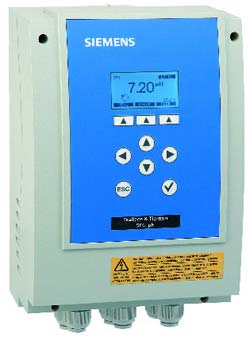

One main function is controlled chemical dosing which is used when disinfectant has to be added, for example. The series of devices matches the MFC system not only in terms of design and dimensions but also in terms of the range of functions. The two types of device are based on the same software and can therefore be combined and communicate with each other via a CAN bus.
Potable water works, industrial processes such as in the food industry, cooling water circuits, and the treatment of boiler feed water are possible areas of use. The SFC devices can also be combined with the Depolox Pool and PCS Plus measuring and control units, which are specially designed for swimming-pool water treatment.
Depending on the application, the SFC system can be fitted with different measuring modules. As in the case of the MFC system, it is possible to choose from several such modules: the 'Depolox 5' three-electrode sensor from Wallace&Tiernan for measuring free chlorine, chlorine dioxide, ozone and potassium permanganate; combination electrodes for measuring the pH value and redox potential; conductivity electrodes; fluoride electrodes. Membrane sensors for measuring free chlorine, total chlorine, chlorine dioxide and ozone are also available. In addition, sensors with a standardized current or voltage output (e.g. 4 to 20 mA) can be connected. This makes it possible to measure any particular parameter. The measuring range and the unit of measurement can be adjusted as required.
The specific plug-in card which belongs to each sensor makes the SFC system into a distinct measuring system for the respective sensor. The card is used to implement measuring-range limits and pre-settings and makes basic parameterization of the device much easier. Thanks to the possible types of control which are integrated into the SFC system, Siemens Water Technologies enables the special forms of control needed in water treatment applications. Like the MFC system, the single-parameter SFC device can be used for fixed-value control, ratio control or a combined form of control, depending on the plug-in card selected. Without a sensor, the SFC performs the role of a ratio controller, with which chemicals can be dosed in proportion to an input variable. The process controller version (SFC PC) performs functions such as parameter optimization during operation as well as combined feedforward control with a reference variable.
The SFC series supersedes the proven Wallace&Tiernan MFA plug-in measuring amplifier, the Wallace&Tiernan PCU controller and the SCU ratio controller. It performs all the previous functions and, compared to the preceding models, is easier to use and provides more possibilities of data link-up. What is also new are CAN-bus communication of the Wallace&Tiernan devices with each other and an SD memory-card slot. The ChemWeb server as well as the OPC Data Access V 2.0 server can be connected via the optional RS 485 interface, which also enables use of the CMS 3.0 visualization software.
The Siemens Industry Sector (Erlangen, Germany) is the world's leading supplier of production, transportation and building systems. Integrated hardware and software technologies combined with comprehensive industry-specific solutions enable Siemens to enhance the productivity and efficiency of its customers in industry and infrastructure. The Sector comprises six Divisions: Building Technologies, Industry Automation, Industry Solutions, Mobility, Drive Technologies and Osram. In fiscal 2007 (ended September 30), Siemens Industry generated sales of approximately EUR40 billion (pro forma, unconsolidated) with around 209,000 employees worldwide. http://www.siemens.com/industry With the business activities of Siemens VAI Metal Technologies (Linz, Austria), Siemens Water Technologies (Warrendale, Pa., U.S.A.), and Industry Technologies (Erlangen, Germany), the Siemens Industry Solutions Division (Erlangen, Germany) is one of the world's leading solution and service providers for industrial and infrastructure facilities. Using its own products, systems and process technologies, Industry Solutions develops and builds plants for end customers, commissions them and provides support during their entire life cycle.












